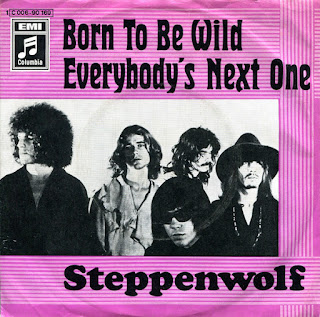STEPPENWOLF - BORN TO BE WILD
Publicada: 9 de maig de 1968
Llistes: EUA: #2 Regne Unit: #18
"Born to Be Wild" de Steppenwolf és un himne clàssic del rock que s'ha convertit en sinònim de l'esperit de llibertat i rebel·lia, particularment associat a la cultura de les motos. La seva inclusió a la icònica pel·lícula “Easy Rider” va reforçar encara més el seu estatus com a símbol del moviment contracultural de finals dels anys 60. Tot i que sovint es descriu com una de les primeres cançons de heavy metal, el seu estil i so també abasten elements de hard rock i proto-metal. La lletra, incloent la menció de "heavy metal thunder” (trons de metall pesant), ha contribuït a la seva associació amb el raw power i l'energia de la música rock.
L'ús de la frase "heavy metal" per part de William Burroughs a la seva novel·la "The Soft Machine" va precedir la seva aparició en aquesta cançó. La descripció de Burroughs d’una addicció com tenint una qualitat "de metall pesant" reflecteix la seva característica exploració dels aspectes més foscos de l'experiència humana, comparant l'addicció amb una substància que no només és vegetal sinó també mineral en el seu pes i densitat. La frase va adquirir una connotació diferent en el context de la música rock, on va passar a representar un so potent i dur caracteritzat per guitarres potents, ritmes contundents i actituds rebels. Tot i el seu estatus icònic i la inclusió de la frase "heavy metal", "Born to Be Wild" no s'ajusta del tot al gènere. John Kay, el líder de Steppenwolf, va aclarir que tot i que la cançó pot evocar una sensació de poder i excitació, la banda es considerava principalment una formació de hard rock basada en el blues més que de heavy metal.
La inspiració de Mars Bonfire per "Born to Be Wild" va sorgir d'un pòster que va veure al Hollywood Boulevard, amb una moto sorgint de la terra envoltada de flames i el lema "Born to Ride” (Nascut per Montar). Aquesta imatge, juntament amb la nova llibertat i emoció de tenir el seu primer cotxe, van influir en la lletra de la cançó. Tot i que inicialment no va destacar per als editors, la cançó va cridar l'atenció de Steppenwolf i es va convertir en un himne definitori per a la banda. Bonfire atribueix el seu èxit més a la sort que a l'assoliment intencional.
STEPPENWOLF - BORN TO BE WILD
Released: May 9, 1968
Charted: US: #2 UK: #18
"Born to Be Wild" by Steppenwolf is a classic rock anthem that has become synonymous with the spirit of freedom and rebellion, particularly associated with motorcycle culture. Its inclusion in the iconic film “Easy Rider” further solidified its status as a symbol of the counterculture movement of the late 1960s. While it's often described as one of the earliest heavy metal songs, its style and sound also encompass elements of hard rock and proto-metal. The lyrics, including the mention of "heavy metal thunder," have contributed to its association with the raw power and energy of rock music.
William Burroughs' use of the phrase "heavy metal" in his novel "The Soft Machine" predated its appearance in this song. Burroughs' description of addiction as having a "heavy metal" quality reflects his characteristic exploration of the darker aspects of human experience, likening addiction to a substance that is not just vegetative but also mineral-like in its weight and density. The phrase took on a different connotation in the context of rock music, where it came to represent a powerful, hard-edged sound characterized by loud guitars, driving rhythms, and rebellious attitudes. Despite its iconic status and the inclusion of the phrase "heavy metal," "Born to Be Wild" doesn't quite fit the genre. John Kay, Steppenwolf's frontman, clarified that while the song may evoke a sense of power and excitement, the band primarily considered themselves a hard rock, blues-based outfit rather than heavy metal.
Mars Bonfire's inspiration for "Born to Be Wild" stemmed from a poster he saw on Hollywood Boulevard, featuring a motorcycle bursting out of the ground with flames engulfing it and the slogan "Born to Ride." This image, coupled with the newfound freedom and excitement of owning his first car, influenced the song's lyrics. Despite not initially standing out to publishers, the song caught the attention of Steppenwolf and became a defining anthem for the band. Bonfire attributes its success more to luck than intentional achievement.














Cap comentari:
Publica un comentari a l'entrada